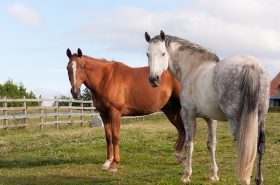Top Tips for Keeping Your Horse Cool This Summer
Now that the summer sun is in full force, keeping your horse cool becomes a top priority. Horses can suffer from heat stress just like humans, so it’s crucial to take proactive steps to ensure they remain comfortable and healthy throughout the hotter months.
Provide Plenty of Fresh Water: Hydration is key during the summer. Ensure your horse has access to clean, fresh water at all times. Horses can drink up to 25 gallons of water a day when the temperature rises, so check water levels frequently, and refill troughs and buckets as needed. Consider adding an electrolyte supplement to their diet on very hot days, or on days where their workload might be increased (such as a horse show) to replace the salts lost through sweat.
Adjust Your Riding Schedule: Plan your riding or training sessions during the cooler parts of the day. Early morning or late evening tend to be best, as the temperature is lower and the sun is less intense. Not only will this be more comfortable for your horse, but it will also reduce the risk of heat exhaustion for both you and your equine friend.
Provide Shade and Shelter: Make sure there’s plenty of shade available in your horse’s pasture. Natural shade from trees is excellent, but if that’s not available, consider installing a shelter or a canopy that provides ample air circulation. When stabled, keep the barn doors open and use fans to help increase air movement.
Use Cooling Techniques: After a workout, help your horse cool down with a hose down or a sponge bath using cool water. Focus on the chest, legs, and underside, where blood vessels are closer to the surface, to effectively lower body temperature. You can also use cooling blankets that are designed to help reduce heat stress after exercise. If your horse suffers from anhydrosis or any other sweat deficit type of disease, come up with a game plan with your veterinarian to ensure your horse feels their best during hot weather.
Clip Your Horse: If your horse has a thick coat or hasn’t shed out properly, consider body clipping them to help them stay cool. This is especially useful for horses that are competing or those that naturally grow a dense coat but still require regular work during the summer.
Monitor for Signs of Heat Stress: Be vigilant and watch for signs of heat stress, which can include excessive sweating, lethargy, increased heart rate, and heavy breathing. If you notice any of these symptoms, take immediate steps to cool your horse down and consult your veterinarian if the symptoms persist.
Alter Their Diet: Feeding can generate a lot of internal heat from the process of digestion, so feed smaller portions more frequently if you can, and consider giving your horse lighter meals that are easier to digest. Adding soaked feeds can also increase water intake, which helps with hydration. Be sure to do any diet changes gradually so your horse can adjust as safely as possible.
Fly Control: Flies and other insects can be a nuisance and cause stress, which can lead to overheating as horses try to swat flies away and become agitated. Implement effective fly control measures around the barn, use fly sheets, masks, and repellents to keep pests at bay.
Regular Vet Check-ups: Schedule regular check-ups with your veterinarian to ensure that your horse is in good health and to discuss any concerns about managing the heat. Your vet can provide additional advice tailored to your horse’s specific needs.
Managing the heat effectively ensures your horse can enjoy the summer months without the risk of heat-related health issues. By adjusting care routines and staying vigilant about your horse’s needs, you can ensure that both you and your horse have a safe and enjoyable season. Remember, proactive heat management is the best way to prevent heat stress and keep your horse at their happiest and healthiest.



